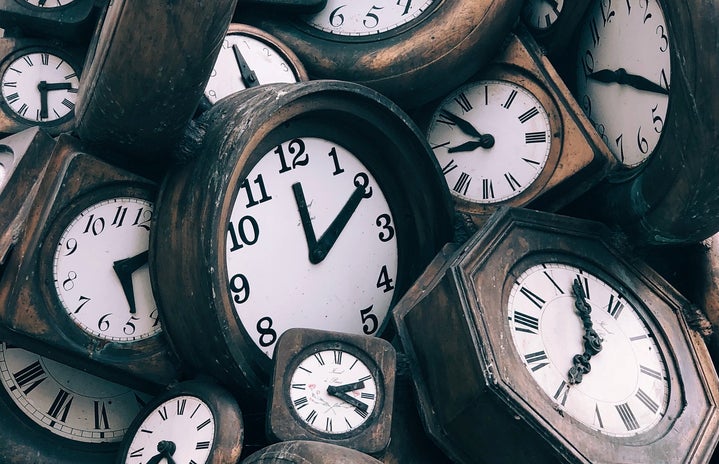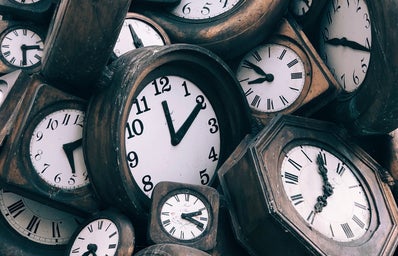The strange way life is passing by lately seems like a permanent state of being. The pandemic of Covid-19, distancing, and lockdowns have forced people into a passive waiting that draws attention to the passage of time, while palpably disordering the way it feels.
Now that people are vaccinated, places are reopening and things are not that crazy anymore, there’s at least a subconscious hope that time will return to normal along with the rest of life, that is already getting back to what it used to be.
But isn’t the idea that time can return to the normal experienced before the pandemic a mistake? The experience of time isn’t ever fixed. It’s a historical phenomenon: our sense of time has just been pulled towards a different abnormality than the one we were used to. Normalcy is relative to the current time period.
Growing old is not easy. In a pandemic, it’s even harder. With restrictions of social isolation imposed by the World Health Organization, in addition to the fear and insecurity in the midst of such a delicate scenario, it has been over two years since it all began. As well as, at least in Brazil, people are still under alert. And day after day, people see life passing through their eyes and still feel like they haven’t lived anything they would like to have to.
“We have been in quarantine for a long time, we grew older in quarantine, and many experiences and plans we had planned for ourselves simply became impossible to achieve and live”, reflects the psychologist João Couto. “When we think about the isolation that Covid-19 forced the world to embrace, it’s important to recognize that it has a major impact on people’s mental health”, he proceeds, pointing out a quote from a guy he had watched explaining what is like for him to live in isolation.
“Do you know how convicted people get punished inside the prisons? They are in a prison, surrounded by thieves, murderers, rapists… do you know how you punish this person? You put him in solitary.”
Our perception of time during pandemic seems to have become more uniform and objective than it’s ever been before. However, what’s strange isn’t that time is moving quickly or slowly, but that each day feels exactly like a day, each minute exactly like a minute.
The days seems to be interchangeable with any other. Wednesday could have been a Monday or a Thursday or, sometimes, particularly during a pandemic, even a Saturday. The consistency with which days have been passing leaves little to tell the difference between them. The rhythm of a day plays itself out mechanically, lacking the variations that brought inconsistency and surprise to the feeling of time passing.
But even if nothing out of ordinary happens in our routines, we are still getting older. And people still feel like they could have done (and even enjoyed, lived) more.
“Growing old is not easy for anyone, and I dare to say that we all, when we start to reach the inevitable end of our life, experience the feeling and the thought of ‘maybe I should have done more’”, João explains. “This is regret, a strong and negative feeling that can shake a person’s mental health heavily. Now, for some people, the pandemic already brought that feeling way sooner. We all lost so many sunny off-days, missed so many birthdays and reunions that would make us feel better. There is no way this is not gonna leave a mark”, the psychologist concludes.
CHILDHOOD
A survey carried out by the Lemann Foundation in partnership with the Instituto Natura revealed that 94% of children and teenagers had some change during the pandemic. According to parents and guardians, 56% gained weight, 44% felt sad, 38% were more fearful and 34% lost interest in school. The survey also showed that the routine of activities at home has changed: 37% of children and teenagers are playing video games or cell phones more often than before Covid-19 and 43% have increased their TV hours. And when it comes to socialization, the interaction between children and young people has also drastically decreased.
This whole situation is even more challenging for children: deprived of contact with colleagues and teachers, with cousins, friends and family, the little ones have also felt the effects of the Covid-19 pandemic. Some say that even more than adults.
“Children are in an extremely crucial moment of their lives. Childhood is supposed to be special, fun, and be a critical point on a person’s social development. If a kid cannot socialize with other people, it will certainly have an effect on their development as teenagers and adults”, João points out. Beatriz Abuchaim, manager of applied knowledge at the Maria Cecilia Souto Vidigal Foundation, also explains that it is playing and doing activities together that children create hypotheses, interpretations, learn to share and talk. The lack of this contact in the present can, therefore, cause some difficulties in the future. “Perhaps they are going to have more difficulty in dialoguing or sharing materials, but that depends on the child’s age and their maturing process in relation to these issues,” she explained to Por Vir website.
LEARNING OVER TIME
Justa as everyday situations always look pretty much the same, in two years, many things in society have changed. The way people relate, the job market, technologies… It all has changed in a very small space-time. So, just as things always look very the same and tedious, everything seems to be very different. It is no wonder that disorders such as anxiety and calling become more recurrent during this period, even though, in a way, each one dealt with it in a unique way.
“People living during any period of time’s evolution would have experienced the sort of temporal disturbance we’ve been going through in different ways. The pandemic’s effects on time haven’t been the same within any one society: what those working essential jobs have experienced is completely different than what remote workers have, just as those living alone haven’t been affected in the same way as those living with roommates or family. There’s no greater consistency in how people living around the world have been affected and responded to the temporal disturbance the pandemic brought”, reflected the writer Adrian Pecotić for “Psychology Today”.
So, what do we do? The pandemic crisis has led people to be more creative with their relationships over time. Many are even “cheating time” to some extent. It speeds up and slows down, bends and restructures time in many different ways.
The “coronavirus times” actually consist of several times, such as “the lockdown time”, “the quarantine” or “the time in the home office”. We learn to live in these new present times. These lessons are deeply personal and differ for each family. Still, there is talk of an experience shared around the world. New rhythms, schedules, habits.
Our experiences in the Covid-19 times trained us in thinking and temporal flexibility. Humanity will face this crisis, but there are others ahead. It may be comfortable to know that we can, and should, cheat time and plan for the future – even when we feel stuck in the present.




